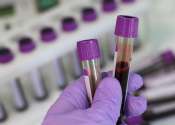Screening with a PSA test has a small impact on prostate cancer deaths but leads to overdiagnosis, finds study
The largest study to date investigating a single invitation to a PSA blood test to screen for prostate cancer has found it had a small impact on reducing deaths, but also led to overdiagnosis and missed early detection of ...
Apr 6, 2024
0
122









